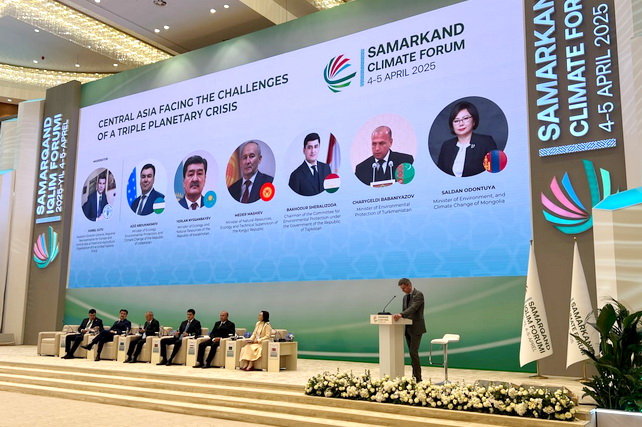
FAO official emphasizes importance of regional cooperation on water security issues
FAO official emphasizes importance of regional cooperation on water security issues
Tashkent, Uzbekistan (UzDaily.com) — As known, the prestigious Samarkand Climate Forum on “Central Asia in the Face of Global Climate Challenges: Consolidation for Common Prosperity” is being held at the "Samarkand Silk Road" Congress Center. The event is dedicated to climate change, water resource management, and ecological sustainability issues in the Central Asian region.
In the Central Asia, average temperatures have risen by 1.5-2 degrees over the past 70 years. The Aral Sea disaster has become a symbol of global ecological crisis. Expert panels, plenary sessions, and policy dialogues organized within the framework of the forum discussed important areas such as reducing the socio-economic impacts of climate change, renewable energy, integrated water resource management, biodiversity conservation, and sustainable urban development.
"Integrated Water Resources Management" Plenary Session
The plenary session on "Integrated Water Resources Management in the Context of Climate Change in Central Asia" was one of the most important events of the forum.
In the session moderated by Barbara Janusz-Pawletta, Regional Representative of the International Water Management Institute (IWMI) for Central Asia, the water ministers of Central Asian countries first presented reports on national priorities and prospects for regional cooperation, followed by representatives of prestigious international organizations expressing their views.
In the second part of the session, high-level representatives of international organizations discussed cooperation on combating climate change and water resource management in the Central Asian region. Best practices, innovative partnerships, and issues of attracting climate investments in the water sector were also considered.
Viorel Gutu: Water and Food Security Require Regional Cooperation
Viorel Gutu, FAO Assistant Director-General and Regional Representative for Europe and Central Asia, speaking at the plenary session, paid special attention to the issue of water security in Central Asia.
"Water security is the foundation of food security," emphasized Gutu. "Without sufficient and safe water, we cannot sustain agrifood systems, protect human health, or ensure economic prosperity. Yet in Central Asia, water use already exceeds renewable resources in several countries, and irrigation losses can reach up to 60% due to outdated infrastructure. Climate change is only making this worse—by 2050, crop yields could decline by 30%, while floods and droughts already cost the region billions in damages."
Mr. Gutu particularly noted the importance of regional cooperation in addressing these challenges. According to him, FAO is working hand-in-hand with governments and partners to promote:
- Water-saving irrigation and climate-smart agriculture that reduce waste and increase resilience;
- Better data and transparent information sharing to support evidence-based decisions;
- Stronger transboundary water governance, ensuring fair and sustainable management of shared water resources;
- And nature-based solutions, like artificial glaciers and aquifer recharge, which can help buffer against water scarcity.
"We need bold leadership and sustained investment. The water crisis does not respect borders, and neither should our solutions," said Gutu in his speech.
While answering questions from forum participants, Mr. Gutu emphasized that sustainable water management is not just about infrastructure—it's about people: "If we want lasting solutions, we must empower those who rely on water the most: farmers, women, and youth."
In his remarks, Gutu explained in detail how FAO is supporting Central Asian countries in adopting drought-tolerant crops, efficient irrigation, and conservation agriculture. According to him, this means using sub-surface irrigation, no-till farming, and mulching, which protect soil and reduce water loss.
"But technology alone is not enough—we need training and capacity building so that smallholder farmers can adopt these innovations," he emphasized.
Gutu also addressed the need to strengthen participatory water governance, noting that in many areas, local communities lack a say in how water is allocated. According to him, creating water user associations and farmer-led decision-making platforms can ensure more equitable distribution.
At the conclusion of the forum, the ministers of Central Asian countries signed a statement on the "Central Asia Water-Land Nextline Programme" (CAWLN). This program is expected to be an important step towards ensuring water security and adaptation to climate change in the region.
The Samarkand Climate Forum continues April 6, with discussions on regional environmental cooperation and climate adaptation strategies.